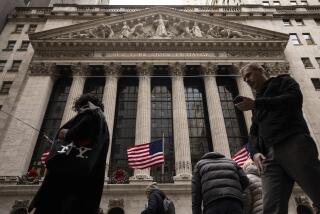Economy Expected to Grow Sluggishly but Skirt Recession
- Share via
WASHINGTON — A prominent business economists group said Monday that the economy will probably grow at a sluggish 1.9% this year, down from 2.1% last year but safely skirting recession.
The National Assn. of Business Economists, whose members represent more than 3,000 companies ranging from banks to manufacturers, said gross domestic product would speed up only to a 2.2% growth rate in 1997.
The government said Friday that GDP grew at a 0.9% rate in the fourth quarter, just one-quarter of the prior period’s rate.
Last year’s 2.1% growth rate was the weakest performance since 1991, when the economy shrank 1%. GDP measures total output of goods and services in the U.S.
“The quarterly growth path for real GDP shows 1996 beginning on a soft note and increasing steadily during the course of the year,” the group said, noting that bad weather and government shutdowns weakened first-quarter growth.
“Despite the slowdown in economic activity, the forecast panel views the chance of recession as only one in four in 1996,” according to the group’s survey.
The risk that the nearly 5-year-old expansion will slip into recession rises to one in three in 1997, it said.
At a news conference to release the survey, NABE President David Berson said the slow-growth scenario increases the chances that the Federal Reserve Board will cut interest rates again, bolstering consumer spending and the housing sector.
“The implication is that the Fed will ease another time or two but not by much,” Berson said. That would help homeowners refinance at lower rates and more easily handle high levels of indebtedness.
On balance, the economists said the interest rate outlook is stable.
“The outlook for interest rates is fairly sedate,” the group said. Short-term rates are likely to fall steadily this year, though they may reverse course near year-end. Long-term rates as measured by the 30-year Treasury bond yield should average 6% this year.
The group warned that the failure of the Clinton administration and the Republican-led Congress to reach a long-term deficit reduction agreement could hurt economic growth and cause a rise in interest rates.
Though consumer spending slowed at the end of 1995, the group did not predict a major drop in spending this year.
More to Read
Inside the business of entertainment
The Wide Shot brings you news, analysis and insights on everything from streaming wars to production — and what it all means for the future.
You may occasionally receive promotional content from the Los Angeles Times.










